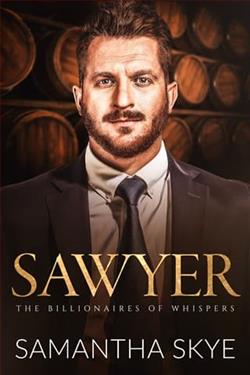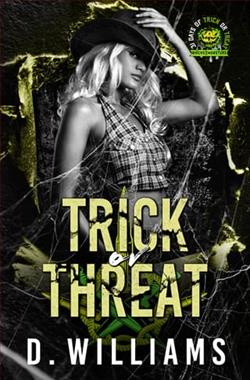Page 32 of Paranoia
We opened the front door, stepped inside, and I was surprised to find the place not nearly as dark and dingy as I’d expected. There were two TVs, both playing ESPN. Two men sat at the bar. One was eating a hamburger and drinking a beer. The otherwas just drinking a Budweiser from the can. Neither bothered to turn around to see who had just entered the bar.
The bartender was a woman in her fifties with dyed blond hair and a pretty face. We ordered hamburgers and beers, then Special Agent Frederick took a moment to chat with the bartender and ease her into a few questions. The bartender’s name was Leslie Hodge. She’d been the manager of this place for more than twenty years.
Frederick laid a few photographs of Ralph Stein and Gary Halverson down on the bar.
The bartender cut her eyes at us and said, “I figured you two for cops as soon as you walked in. We get a fair number of cops in here. I was sorry to hear about Ralph and Gary. They were all anyone talked about for a couple of days after the explosion.”
Leslie told us the two retired cops used to come into the bar almost every afternoon. “They usually left about seven, when they’d walk home. More like staggered. They were good customers, tipped well. Everyone liked them.”
It wasn’t anything specific the bartender said, but something about the way she talked about the two men made me suddenly realize: Gary and Ralph hadn’t just been friends—they’d been a couple. I felt like an idiot for not putting the pieces together sooner. I mean, theylivedtogether. I didn’t care one way or the other and didn’t know anyone who would. It was their choice to keep things on the quiet side. I just couldn’t believe I’d overlooked something so obvious.
Leslie said, “Gary introduced backgammon night on Tuesdays. We’re going to call it Gary’s Backgammon Night from now on. Ralph used to work in the kitchen when we were shorthanded. He refused any pay. Sometimes he’d ask us to donate to someenvironmental fund. Cops must have pretty good retirements. They never seemed to worry about money. Gary and Ralph just liked helping people. We’re gonna miss those guys.”
After lunch, Frederick and I spoke to Ralph Stein’s sister, Rachel. She was still grieving the loss of her brother but told us about how Ralph had been a grandfather figure to her grandchildren. How he had enjoyed their company and had displayed their artwork on his refrigerator. Then she broke down and started to sob uncontrollably.
Later, when Special Agent Frederick was driving me back to the airport, she turned to me unprompted and said, “You may be onto something. Those two don’t seem like candidates for suicide.”
All I could say was “I’ll keep you in the loop.”
CHAPTER 48
ROB TRILLING SAT quietly with Terri Hernandez. They were on surveillance in the Bronx, listening in on a conversation going on inside the warehouse. Their informant, Jaime Nantes, was working off a serious assault charge that included the use of a Colt .45, and he had agreed to cooperate in exchange for a chance to avoid a lengthy stay upstate.
Nantes had reluctantly worn a transmitter that would relay whatever he heard inside the warehouse. They hoped it would help them piece together a case and figure out who’d been killing the dopers they’d been looking at the last few months.
Hernandez said, “Just keep your eyes and ears open, Super Jock. This isn’t like any police work you learned about in the academy or working homicide cases. There’s an art to dealing with informants. You have to remember to never trust them.”
“If we can’t trust them, why do we use them?”
“Because we’re not trying to arrest Boy Scouts. The people who mix with the criminals we’re looking at are generally criminals themselves. All he’s doing is picking up conversations. We just have to hope he’s more afraid of going to prison for five to seven years than he is of being found out.”
“Couldn’t we just send him in with a recorder?”
“At least you’re starting to ask the right questions. In case he gets in trouble, since he’s under our instructions, we need to be ready to go in and rescue him. Not that I think anything’s gonna happen. But with these other players coming in to talk to the group today, I wanted to make sure we were erring on the side of caution.” She adjusted the controls on the receiver linked to the transmitter hidden in the informant’s baseball cap. Then she looked at Trilling and said, “All you really have to do is sit there and look pretty. I know you’re good at that.”
At least she acknowledged his existence now and again. Though Trilling wasn’t sure if he liked it better when she ignored him or when she actively insulted him.
When they first arrived at this particular surveillance spot, Trilling had noticed and photographed an electric Porsche Taycan sitting at the far end of the block. It had to belong to someone inside. The tag came back with a company Trilling was willing to bet didn’t really do much. He’d give all the information to Walter Jackson later. He also had a couple of new puns he wanted to try out on the jovial criminal intelligence analyst.
Several voices could be heard over the receiver, but the problem was the transmission faded in and out. Hernandez had said she thought it had something to do with the building and the metal in the columns. All Trilling could tell from the conversation was that some men who were not part of the group were inside.
Hernandez said, “It’s a little unusual that they’re all speaking English. I think at least one of the outsiders doesn’t speak good Spanish. They’re talking about some kind of business. It sounds a little tense.”
“Something we should worry about?”
Hernandez kept listening. She didn’t answer, which told Trilling the answer was yes, they should be worried.
Trilling wished he knew who the gang was talking to. Based on the voices he heard, he figured there were three people in there talking with one outsider, and there was a guy with the outsider who stayed silent much of the time. This was in addition to Nantes, who also had remained relatively quiet through the whole conversation so far.
Suddenly, the transmitter came in clearly. Someone said, “We run a tight ship. We don’t include a lot of people in our business. It’s not like the old days, when your dad …” The transmission faded out. Trilling couldn’t hear what was being said, but he now got the same sense as Hernandez. The discussion was tense.
The conversation resumed when the outsider, sounding younger than everyone else, said, “I don’t care how things used to be done. I just want a stable distributor who can handle my business. As long as we can stay quiet and under the radar, we’ll all make money. Lots of money. That was the problem in the old days. Everyone wanted to be famous one way or another.Por la fama y la infamia.Whether it was being the biggest gangster in town or getting their names on buildings. Everyone was a showoff.”
Another voice said, “What do you know about the old days? You talk good, but we ain’t seen nothing from you yet. It don’t matter who you’re related to. We need to see some product that we can move on the streets.”
“I don’t do auditions.”
“Then we don’t have no use for you.”















